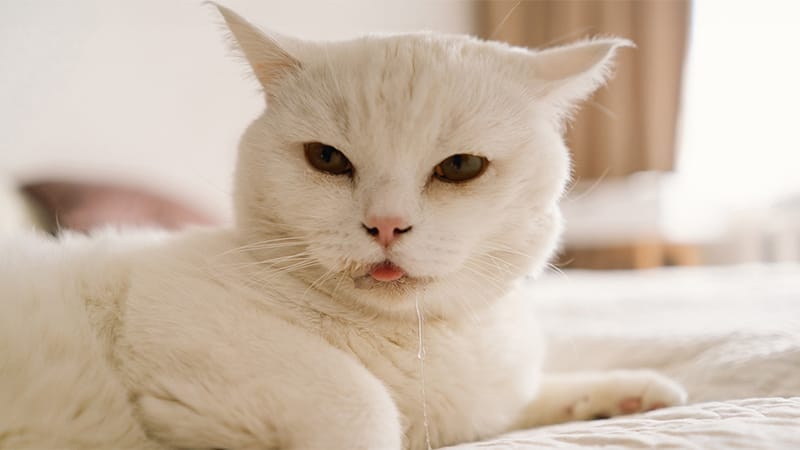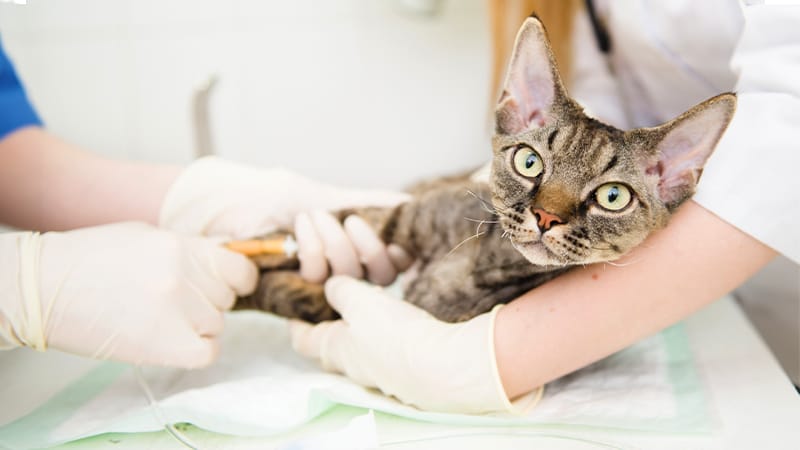Lily Poisoning in Cats: Everything You Need to Know
Lilies are beautiful, but toxic to cats. Learn more about lily poisoning, including the signs, treatment options, and prognosis.
In the spring, particularly during the Easter season, it is common to bring beautiful lilies into homes. However, if you have cats as part of your family, it is important to know that these plants are toxic to them. To keep your pet safe from lilies, read on as we discuss the signs of lily poisoning, what steps to take if you suspect your cat has been exposed to lilies, available treatment options, the prognosis for affected cats, and essential tips to ensure your cat’s safety at home.
Understanding Lily Poisoning in Cats
Even a small amount of ingestion, such as chewing on a leaf or drinking water from a vase containing lilies, can lead to severe lily poisoning and induce acute kidney failure in as little as 12 to 24 hours. If your cat does not receive any treatment, their kidneys will fail, leading to death 24 to 72 hours after ingestion.
While there are many species of lilies, there are two that are particularly toxic to cats, including true lilies (Lilium species) and daylilies (Hemerocallis species). True lilies include Easter lily, Tiger lily, Oriental lily, Japanese show lily, Rubrum lily, Asiatic lily, Stargazer lily, and Wood lily.
Although calla lily and peace lily have “lily” in their name, they are not true lilies and do not cause kidney failure in cats. However, they do contain oxalate crystals that can cause milder signs, such as irritation in the mouth, throat, tongue, and esophagus. The least toxic of all lily plants is the Peruvian lily, which can cause mild upset stomach.

Signs of Lily Poisoning in Cats
Early recognition and intervention for lily poisoning in cats can greatly improve the chances of a positive outcome.
The following are common signs to watch for:
- Vomiting: Cats may experience vomiting within a few hours of ingesting any part of a lily plant.
- Loss of appetite: A sudden decrease in appetite or refusal to eat can be an indication of lily poisoning in cats.
- Lethargy: Cats may become unusually tired or weak, showing a lack of energy and interest in their surroundings.
- Increased thirst and urination: Lily poisoning can lead to increased water intake and frequent urination.
- Drooling: Excessive drooling or hypersalivation may occur due to the irritant effects of the lily toxins.
- Dehydration: Cats may exhibit signs of dehydration, such as dry gums, sunken eyes, and decreased skin elasticity.
- Kidney failure: This is the most severe consequence of lily poisoning in cats and can manifest as decreased urine production, increased thirst, and ultimately, a decline in overall health.

What to Do if You Suspect Lily Poisoning
If you suspect that your cat has been exposed to lilies or is showing any signs of lily poisoning, contact your veterinarian immediately. They may suggest calling the Pet Poison Helpline at 855-764-7661. If your veterinarian is not available, contact the nearest emergency veterinarian, such as MedVet. It is helpful if you know which variety of lilies your cat was exposed to and the amount if consumed. Do not induce vomiting unless directed by your veterinarian. Quick treatment is essential for cats with lily poisoning to increase their chance of survival.
What to Expect from Lily Poisoning Treatment
The treatment for lily poisoning in cats focuses on preventing further absorption of toxins and supporting the cat’s kidneys.
Depending on the severity of the poisoning, your veterinarian may recommend the following:
- Inducing vomiting: If the ingestion occurred within the past two hours and your cat is not showing any signs, your veterinarian may induce vomiting to remove the toxins from the stomach.
- Activated charcoal: Activated charcoal may be given to your cat to bind the toxins and help it move through the gastrointestinal tract.
- Testing: Baseline lab work, including a complete blood count (CBC), serum chemistry profile, and urinalysis are all important to evaluate your cat’s organ status, especially the kidneys. An abdominal ultrasound may also be recommended to see if there is any kidney damage.
- Intravenous fluids: Cats with lily toxicity often require intravenous fluids to maintain hydration and support kidney function. Fluids are given for a minimum of 48-72 hours while monitoring your cat’s urine output, which may require them to have a urinary catheter.
- Kidney support: Medications and treatments may be administered to support kidney function and minimize damage.

Prognosis for Cats with Lily Toxicity
The prognosis for cats affected by lily toxicity varies based on factors such as the amount ingested, timing of intervention, and the cat’s overall health. Cats that receive prompt veterinary care have a higher chance of recovery. However, if treatment is delayed 18 hours or more after ingestion or your cat ingested a significant amount of lilies, your cat will likely have irreversible kidney failure. If your cat stops urinating about 24 hours after ingestion, it is unlikely they will survive.
Cats who survive lily poisoning will need to have regular checkups and bloodwork once they are released to ensure their kidneys continue to recover.
Preventing Lily Toxicity in Cats
To ensure the safety of your cat, it is advisable to avoid having lilies in your home or garden. Instead, choose cat-friendly plants and flowers that are non-toxic to felines. There are numerous beautiful alternatives to lilies, including orchids, roses, daisies, and sunflowers. By selecting these safer options, you can enjoy the beauty of flowers while also providing your cat with a pet-friendly environment.
Learn more ways to keep your pet safe and out of the ER.
FAQs
Contents



